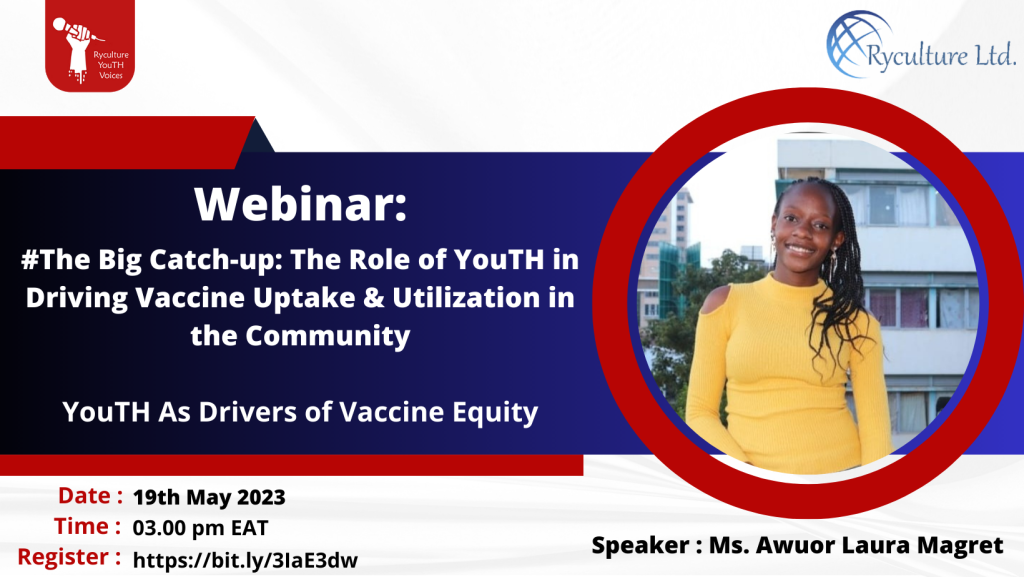I am Laura, a medical student and a Sickle Cell Disease advocate, partly because the disease is highly endemic where I come from but also because I have experienced firsthand the mortality associated with SCD. Now you might be asking yourself what is the link between SCD and vaccination, people with SCD are at increased risk of infection from encapsulated bacteria such as haemophilus influenza for which a vaccine is available. WHO therefore recommends these vaccines as an add on to the regular programme. The catch is that this demographic doesn’t always get these vaccinations. Vaccination has been deemed as the single most efficient and cost-effective health prevention measure being responsible for preventing over 4 million deaths every year (WHO). I believe that the youth have a major role to play as part of combined efforts towards increasing vaccine uptake and utilization globally.
Education and awareness; The youth can help increase vaccine uptake by providing information to the general public on how vaccines work, the diseases that can be prevented by vaccination, and anticipated side effects if any, additionally with the advent of social media, there has been a lot of misinformation on the internet regarding vaccination, the youth can debunk these myths and misconceptions by providing accurate and evidence based information to the public thereby allaying their fears. One of the widely acknowledged misconceptions that I recently learnt of during my classes was that the measles vaccine causes autism, a developmental disorder in children, this was because the disorder is usually first noticed at around 9 months, which coincides with the time when the vaccine is usually administered, research has however shown that there is no link between the two events.
Advocacy and policy making; The youth should be involved in advocating for vaccine equity, that is the allocation of vaccines to countries on a case-by-case basis, the COVID 19 pandemic was an eye opener on the inequities that exist with regard to vaccine availability. Youth should be included in discussions with governments and stakeholders on matters regarding policy making in order to ensure sustainability. Additionally, advocating for interventions such as the establishment of mobile vaccination centers especially in remote areas.
Leveraging on “missed opportunities”; Missed opportunities for vaccination occur when individuals visit health care facilities and do not get vaccinated due to a number of factors such as in availability of resources, stock outs, and contraindications to vaccination that are not valid. These can be addressed through advocacy efforts by the youth to equip health care facilities, and adequate training of healthcare workers.
Research; The youth can help drive vaccine efforts by being involved in research to identify barriers to vaccine uptake in various parts of the country and consequently disseminating research findings to aid in decision making and policy implementation.
Volunteering; some immunization centers have a shortage of personnel thereby reducing the number of people that can be served in a given day, by offering services such as registering individuals who come for vaccination, giving directions and monitoring of patients, the youth can play a big role in driving vaccine uptake.
Getting vaccinated! Statistics show that over 80% of Kenya’s population is under 35 years, that is a majority of the population. By getting vaccinated, they are able to influence their peers and family to get vaccinated as well, since they are able to observe that the vaccines are safe and effective.
WORLD IMMUNIZATION WEEK.
Youth as drivers of vaccine equity.
I am Laura, a medical student and a Sickle Cell Disease advocate, partly because the disease is highly endemic where I come from but also because I have experienced firsthand the mortality associated with SCD. Now you might be asking yourself what is the link between SCD and vaccination, people with SCD are at increased risk of infection from encapsulated bacteria such as haemophilus influenza for which a vaccine is available. WHO therefore recommends these vaccines as an add on to the regular programme. The catch is that this demographic doesn’t always get these vaccinations. Vaccination has been deemed as the single most efficient and cost-effective health prevention measure being responsible for preventing over 4 million deaths every year (WHO). I believe that the youth have a major role to play as part of combined efforts towards increasing vaccine uptake and utilization globally.
Education and awareness; The youth can help increase vaccine uptake by providing information to the general public on how vaccines work, the diseases that can be prevented by vaccination, and anticipated side effects if any, additionally with the advent of social media, there has been a lot of misinformation on the internet regarding vaccination, the youth can debunk these myths and misconceptions by providing accurate and evidence based information to the public thereby allaying their fears. One of the widely acknowledged misconceptions that I recently learnt of during my classes was that the measles vaccine causes autism, a developmental disorder in children, this was because the disorder is usually first noticed at around 9 months, which coincides with the time when the vaccine is usually administered, research has however shown that there is no link between the two events.
Advocacy and policy making; The youth should be involved in advocating for vaccine equity, that is the allocation of vaccines to countries on a case-by-case basis, the COVID 19 pandemic was an eye opener on the inequities that exist with regard to vaccine availability. Youth should be included in discussions with governments and stakeholders on matters regarding policy making in order to ensure sustainability. Additionally, advocating for interventions such as the establishment of mobile vaccination centers especially in remote areas.
Leveraging on “missed opportunities”; Missed opportunities for vaccination occur when individuals visit health care facilities and do not get vaccinated due to a number of factors such as in availability of resources, stock outs, and contraindications to vaccination that are not valid. These can be addressed through advocacy efforts by the youth to equip health care facilities, and adequate training of healthcare workers.
Research; The youth can help drive vaccine efforts by being involved in research to identify barriers to vaccine uptake in various parts of the country and consequently disseminating research findings to aid in decision making and policy implementation.
Volunteering; some immunization centers have a shortage of personnel thereby reducing the number of people that can be served in a given day, by offering services such as registering individuals who come for vaccination, giving directions and monitoring of patients, the youth can play a big role in driving vaccine uptake.
Getting vaccinated! Statistics show that over 80% of Kenya’s population is under 35 years, that is a majority of the population. By getting vaccinated, they are able to influence their peers and family to get vaccinated as well, since they are able to observe that the vaccines are safe and effective.
Article written by Ms. Laura Awuor – a medical student, sickle cell disease advocate and research enthusiast.

